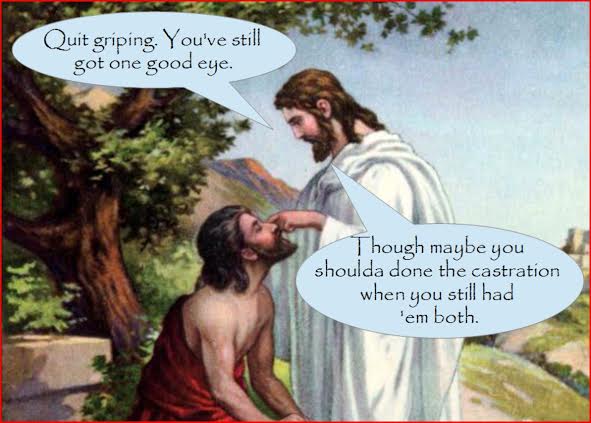
Guest post by Neil. You can read Neil’s writing at Rejecting Jesus.
I didn’t reject my faith so that I could wallow in sin (though I do like a good wallow now and then). I didn’t turn away from Christianity as an act of rebellion against God, nor did I give it up so I could set myself up as Lord of my own life (though why that would be a bad thing, I’m not sure).
Christians like to tell me that these are the reasons I became apostate, but of course they’re not. Rather, I’d become aware that there’s no such thing as ‘sin’. Sin is a peculiarly religious invention with no traction in the real world; there’s only human behavior. I had reached a point where I understood there was no God, certainly not the Christian version and it follows you can’t rebel against something that doesn’t exist, nor, indeed, can you set yourself up as it.
Instead, I’d taken a long hard look at the claims of Christianity and in particular what the Bible had to say about Jesus. I asked myself:
- whether human beings can return from the dead (no), can be born of virgins (no), can walk on water (no).
- whether Jesus’ claims – that he would be back within his disciples’ lifetime to establish the Kingdom of God on Earth; that he would appear to them in the sky with the heavenly host; that he would bring about God’s judgement, again during his own generation – actually happened. (Evidently they didn’t.)
- whether his promises were true – that whatever believers ask of God will happen; that his followers would do even greater miracles than Jesus himself; that they would be as one. (Another resounding ‘no’.)
- whether I as a Christian, and whether any other believers anywhere, actually did as Jesus commanded. Did we sell all we had to give to the poor? Love our enemies? Turn the other cheek? Go the extra mile? Give to all who asked? Heal the sick? Forgive repeatedly?
Some might have done so, but by and large, no, we didn’t. We couldn’t even manage not to judge in case we were judged in return. No-one I knew or heard preach or even read about did any of the things Jesus commanded.
I could only conclude that this was because a) Jesus’ expectations were far too demanding and b) Christians don’t believe in him anyway. They may think they do – they like what he appears to say about marriage when they’re up for a little gay-bashing – but really they’re only interested in Paul’s ‘Christ’. Christ, the mythologized version of Jesus, gives them a buzz and – extra bonus – doesn’t expect too much of them. They can even carry on with the gay-bashing if they want. But Jesus? Him they don’t want to know – he’s too demanding, too extreme, too dead.
Every time, then, Jesus came up lacking: his promises were hollow, his prophecies unfulfilled, his morality impossible and his miracles and resurrection more than unlikely. Reason, experience and evidence told me that Jesus as we have him in the gospels is nothing more than the creation of a credulous age; his alter-ego, ‘the Christ’, even more so. Once I realized this – once I had this revelation, my very own deconversion experience – I was free. Free to live my life, to think for myself and be who I am. I recommend it to you; let the self-evident truth that faith is nothing more than self-delusion set you free too.

I had a similar journey where I realized that there had to be excuses for so many of Jesus’s promises. Why, we believed in the rapture, but technically the rapture should have happened when the disciples were still alive… So why hadn’t it for another two thousand years? There were plenty of rationalizations also for Jesus’s claims that we would move mountains and the like, but the explanations began to ring hollow. If God didn’t fullfil Jesus’s prayers, why would he ours?
What has been most striking to me in deconversion (mine happened over a period of several years, a long time ago) is the extraordinary joy I finally felt in being outside Christianity. To use the word, ‘freedom’ simply doesn’t cover the expanse of new world that became available to me, the simple human bond that I felt, first with myself, (having been honest in the mirror and admitted I did not believe) and secondly, with the world and humanity (here we are all together, just us…) It seems to me an ideal incentive to live well and fully, more than I ever felt in any Christian paradigm.
Thanks, Neil.